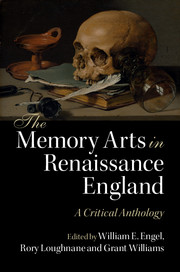Book contents
- Frontmatter
- Dedication
- Contents
- List of figures
- Acknowledgements
- A note on abbreviations
- Introduction
- PART I The art of memory
- PART II Rhetoric and poetics
- PART III Education and science
- Introduction to Part III
- III.1 Thomas Elyot, The Governor (1531)
- III.2 Roger Ascham, The Schoolmaster (1570)
- III.3 Levinus Lemnius, The Touchstone of Complexions (1576)
- III.4 William Kempe, The Education of Children (1588)
- III.5 John Brinsley, Ludus literarius (1612)
- III.6 Robert Burton, The Anatomy of Melancholy (1621)
- III.7 Thomas Sprat, The History of the Royal Society (1667)
- III.8 John Wilkins, An Essay towards a Real Character (1668)
- III.9 Obadiah Walker, Of Education (1673)
- III.10 Robert Hooke, ‘An Hypothetical Explication of Memory’ (1682)
- PART IV History and philosophy
- PART V Religion and devotion
- PART VI Literature
- Index
- References
III.5 - John Brinsley, Ludus literarius (1612)
from PART III - Education and science
Published online by Cambridge University Press: 05 August 2016
- Frontmatter
- Dedication
- Contents
- List of figures
- Acknowledgements
- A note on abbreviations
- Introduction
- PART I The art of memory
- PART II Rhetoric and poetics
- PART III Education and science
- Introduction to Part III
- III.1 Thomas Elyot, The Governor (1531)
- III.2 Roger Ascham, The Schoolmaster (1570)
- III.3 Levinus Lemnius, The Touchstone of Complexions (1576)
- III.4 William Kempe, The Education of Children (1588)
- III.5 John Brinsley, Ludus literarius (1612)
- III.6 Robert Burton, The Anatomy of Melancholy (1621)
- III.7 Thomas Sprat, The History of the Royal Society (1667)
- III.8 John Wilkins, An Essay towards a Real Character (1668)
- III.9 Obadiah Walker, Of Education (1673)
- III.10 Robert Hooke, ‘An Hypothetical Explication of Memory’ (1682)
- PART IV History and philosophy
- PART V Religion and devotion
- PART VI Literature
- Index
- References
Summary
About the author
John Brinsley (fl. 1581–1633) was a schoolmaster in Leicestershire who used Lily's Latin grammar but branched out to develop a reading survey method that was praised by Samuel Hartlib. He married a sister of Bishop Joseph Hall and moved to London, where he wrote and lectured.
About the text
This work, as the subtitle announces, is ‘intended for the helping of the younger sort of teachers’. It adapts aspects of the traditional humanist education for use in smaller towns. Unlike earlier pedagogical treatises, however, emphasis is placed on close reading, instruction in the vernacular and using translations of the classics. The interlocutors are two schoolmasters, Spoudeus (in Greek, ‘diligent’), who goes to his old friend, Philoponus (‘lover of toil’), for advice about preparing lesson plans. This excerpt concerns tips for teaching the rudiments of classical languages.
The arts of memory
Spoudeus, like many teachers past and present, is frustrated by his students’ inability to retain information. In this passage he seeks a better method for his pupils to learn the root forms of words: ‘But I would think, these radices should be very hard to remember’; to which the more seasoned Philoponus replies, ‘Not so’, and explains how the memory arts can be applied to everyday classroom practices.
Textual notes
Ludus literarius: or, the grammar schoole (London, 1612), Hh1r–Hh2r.
Ludus literarius
[…]
Not so: for there is such an agreement and harmony between all the four tongues, or some of them in many words, as will make the learners to take a delight in them, and much quicken and confirm the memory of the weakest; if it be but by the very sounding of one word like another.
Those words which they cannot remember thus, direct them to remember them by some other name or thing which we know well; being of a like sound: which so soon as they but conceive, the Greek or Hebrew words may come to their mind, or the significations of them.
Here must be remembered that maxim in the art of memory, that the more we do animate or give life unto the object, or thing whereby we would remember, the more presently will the word which we would remember come to our mind.
- Type
- Chapter
- Information
- The Memory Arts in Renaissance EnglandA Critical Anthology, pp. 163 - 165Publisher: Cambridge University PressPrint publication year: 2016



